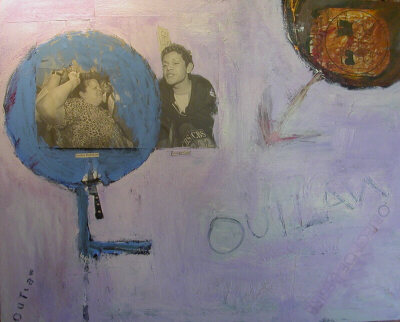 Jay Michaelson
Jay MichaelsonRabbi Greenberg is more moderate than I am. Since writing his pioneering, pseudonymous essay in 1993 (available online at www.indegayforum.org), he has made communication the hallmark of his work. He wants to remain in dialogue with people who think that he's chosen his sexuality, and chosen wrongly. I want to tell them to go to hell. I no longer have any patience for these shame-filled people, and I feel dirtied when I come into contact with them. I spent the month of February writing a thirty page response to the Roth Tshuvah on homosexuality, and I have never felt so polluted in my life. Not even when I cried to God, begging him to change me, one Purim night in Jerusalem. Not when I sought anonymous sex in the dark. For a while, it was very important to me to be accepted. Now, it's very important for me not to care.
Greenberg, then, is probably a much better activist than I am. Maybe he's just dealt with his stuff better surely having a life-partner helps and so he's able to sit down with these people without feeling nauseated. I also feel like, precisely because Steve is more reticent about his own spirituality, he is a more effective advocate in a religious world where spirituality is often seen as suspect. These spiritually-closeted rabbis, they don't understand only my love of God sustains me in the face of their hatred.
"The first mistake in creation is aloneness," Greenberg said at his book launch, a few minutes after our interview concluded. "It's the first time God says lo tov.' So clearly gay people are not meant to be alone now either."
That's it, I wanted to say. That's what they have to understand. That we are fulfilling God's Desire by expressing love. That, since all is God, what looks like wrestling is really a loving embrace of the One with the One. Who is closer to God the gay man who loves another gay man, or the straight man who analogizes that love to bestiality?
Steve and I began our conversation at the Manhattan JCC, a few minutes before the book launch event.
Z: So, we're sitting down to talk in the midst of controversy: the President just announced his support for a constitutional amendment to ban gay marriage. How are these recent developments affecting how you present the book?
SG: Well, it's good fortune for me as a writer. I've been working on this book for years, and this is just a fortunate coincidence. I think what the controversy is showing is how important it is to not write either for the "yea" or the "nay" side. It's easy to do that, but you're preaching to the choir.
Z: "Wrestling with God and Men" is very overt in speaking to multiple audiences. It even offers different arguments for each.
SG: The only way I could handle this task was by making a conscious effort to speak in different frames for different purposes, and make it clear what I was doing. I'm modeling how two different communities can find a way to live together, with different halachic methodologies but both with commitment to Torah. One group must be willing to risk a methodological jump, and the other group must be willing to risk their hearts and souls. Both take a risk in being partial. But it's more important to find a policy to live together than to be right. Being right, right now, is probably a kind of hubris that we can't afford.
Z: I find it frustrating that non-gay people are trying to tell gay people what gay means. I'm reminded of something that Joseph Kramer, the founder of Body Electric said. He was asked what, if anything, he fears, since he's done so much pioneering erotic and spiritual work. He said he fears toxic, shame-based people, because just being around such people, they affect you. How are gay people supposed to risks their hearts and souls in this way?
SG: Let me ask another question. I think Orthodoxy is going to evolve on this issue. But we're used to thinking about the next three months, the next year. What do you do if it's going to take ten years? The halachic process is not going to move quickly. But the process begins by bringing people to a table, rather than screaming at each other and walking away, in which case neither of the consciousnesses are affected.



The Hamas Class of 1992
Michael Shurkin
Every City has a Soul
Jill Hammer
Wagner in Israel
Margaret Strother
Wrestling with Steve Greenberg
Jay Michaelson
T Cooper
Abi Cohen
The Stable
Ira Stone
Archive
Our 450 Back Pages
Saddies
David Stromberg
Zeek in Print
New Spring 2004 issue now on sale!
About Zeek
News & Events
Contact Us
Tech Support
Links
From previous issues:
sha'atnez
Abraham Mezrich
Faith
David Goldstein
Life During Wartime
Jay Michaelson